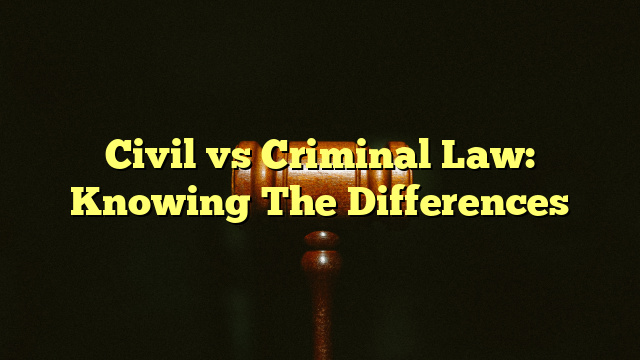Table of Contents
- Types of Cases Under Civil Law
- Types of Cases Under Criminal Law
- Primary Objectives of Civil Law
- Primary Objectives of Criminal Law
- Penalties for Violating Civil Law
- Penalties for Violating Criminal Law
- Who Brings a Case in Civil Court
Types of Cases Under Civil Law
Civil law deals with disputes between individuals, businesses, or organizations. The cases that fall under civil law include:
- Breach of contract
- Property damage
- Personal injury
- Divorce
- Custody disputes
Types of Cases Under Criminal Law
Criminal law deals with cases that involve a crime against society as a whole. The cases that fall under criminal law include:
- Murder
- Robbery
- Rape
- Assault
- Drug possession and trafficking
Primary Objectives of Civil Law
The primary objectives of civil law are:
- To compensate the injured party for the harm caused by the defendant.
- To deter others from committing similar acts in the future.
- To uphold individual rights and enforce contracts.
Primary Objectives of Criminal Law
The primary objectives of criminal law are:
- To punish the defendant for the crime committed.
- To protect society by removing dangerous individuals from the community.
- To deter others from committing similar crimes in the future.
Penalties for Violating Civil Law
The penalties for violating civil law are usually financial in nature and are designed to compensate the injured party for their losses. The most common penalties include:
- Monetary damages
- Restitution
- Equitable remedies (e.g. specific performance or injunctions)
Penalties for Violating Criminal Law
The penalties for violating criminal law can be severe and may include:
- Fines
- Imprisonment
- Probation or parole
- Community service
- Death penalty (in some states or countries for certain crimes)
Who Brings a Case in Civil Court
In civil law, the injured party (known as the plaintiff) brings the case to court. The plaintiff must provide evidence that the defendant caused harm or breached a contract, and the defendant must then defend themselves against these claims. The burden of proof in civil cases is lower than in criminal cases, as the plaintiff only needs to prove their case by a preponderance of the evidence, which means that it is more likely than not that the defendant is responsible for the harm caused.
Civil and criminal law are two distinct areas of the legal system, each with their own set of rules and objectives. Understanding the differences between these two types of law can help individuals better navigate the legal system and protect their rights in the face of legal challenges.


Knowing the differences between civil and criminal law is essential to ensure justice is served. Those who don’t understand the nuances of civil vs criminal law, could end up in serious legal issues.
Knowing the differences between civil and criminal law is essential in understanding our legal system.